
 Flash News
Flash News
Diaspora votes, counting process for political entities in 12 districts concludes
Government media invents the article about the "reaction of DP figures" against Berisha & LaCivita. The author does not exist and the text is a product of ChatGPT (whichs says it's fabricated)
Crashed by a 16-year-old on a motorbike, the elderly man ends up in the Shkodra hospital
Foreign exchange, May 18, 2025
Knife wound in Durrës, perpetrator on the run
The market is "suffocated" by the euro, falling to another historic low
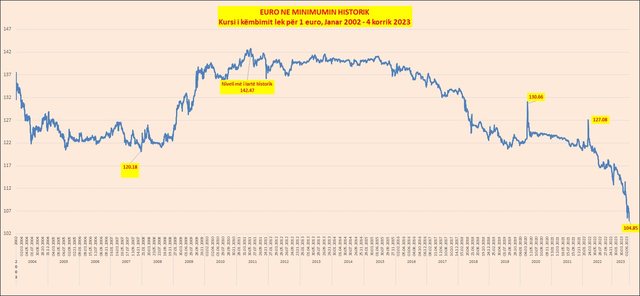
The common currency has continued to lose points at a fast pace in relation to the Lek, exceeding all forecasts.
According to the official exchange rate of the Bank of Albania, one euro was exchanged today for 104.85 ALL, depreciating by 0.86 ALL compared to the previous day. This is the biggest daily drop this year and the strongest since December 28, 2022.
At these levels, the Euro has marked another historic minimum in exchange rates with the Lek, since it began to be implemented as an official currency in January 2002.
Compared to the beginning of the year, the Euro has fallen by 9.69 ALL, or 8.4%, while compared to the same period a year ago, when the common currency traded at 119.12 ALL, it is exchanged for 14.35 ALL less (12% depreciation). .
In the market at noon, the Euro went down to 104 lek, according to sources from the market.
Contacted by "Monitor", major market players said that this trend is related to the high supply in the market. According to them, the market is "drowned" in euros and traders have nowhere to sell, while they are not buying.
The increase in the number of tourists has influenced the increase in the supply of foreign currency. In May, according to INSTAT, about 17% more foreign citizens entered the country than in the same period a year ago, while for the 5th month there are 42.5% more entries. However, in May, when the strong fall of the euro began, the growth rates of foreigners were the lowest compared to the previous months.
Another sustainable source of foreign exchange is informal inflows, which are mainly channeled into the real estate market. INSTAT announced that in the first quarter the economy grew by 2.76%, while "Real estate activities" influenced by +0.62 percentage points, and "Construction" by 0.42 percentage points, both influencing 38% of total growth of the economy.
The strong fall also encourages speculation in the market. Foreign exchange agencies have increased the selling-buying margin to around 1.5 ALL, an indicator of large fluctuations, while generally this margin fluctuates between 0.5-1 ALL.
Market players expect that the euro will continue to be weak, as after the 20th the arrivals of immigrants increase. Traditionally, August and December always mark the lowest values of currency exchange due to increased inflows from immigrants.
All other currencies fall
Besides the euro, all other currencies have recorded a strong decline, showing that the fluctuations are related to the internal factors of the high supply of currency, which causes foreign currencies to pull each other down. The dollar fell by 0.95 ALL to 96.18 ALL. The pound depreciated by 0.90 allek, to 122 allek, the Swiss franc by 0.42 allek, to 107.49 allek.
The economy slowed in the first quarter
One of the arguments of the officials has been that the strengthening of the lek reflects the good performance of the economy. Meanwhile, the latest data from INSTAT revealed that at least in the first quarter of the year, the growth rates of the economy have slowed down, reflecting the consequences of high immigration that has affected consumption and price increases.
In contrast to this trend, real estate has kept the economy afloat. Growth in trade, hotels and transport, an indicator of consumption, has been minimal, while industry has declined, reflecting unfavorable international conditions for selling prices and rising business costs. Especially the industry, mainly the exporters, have been significantly affected by the devaluation of the euro, which has reduced their income in lek.
INSTAT announced that the Gross Domestic Product (GDP) in the first quarter of 2023 is estimated to grow by 2.72%, compared to the first quarter of 2022. This is the lowest growth rate since the third quarter of 2020, when the country was suffering the consequences of the pandemic./ Monitor
Latest news

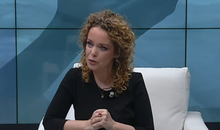

Arbana Osmani returns to television, here's where we'll see her
2025-05-18 20:15:24
PLAN A: Democrat in heart, democrat in mind, democrat in the world
2025-05-18 19:50:49
Pope meets with Zelensky after inauguration Mass
2025-05-18 19:26:03


Pope Leo calls for unity, vows not to be an "autocrat"
2025-05-18 18:26:51

Monika Kryemadhi comes as a film actress, shares footage from the filming set
2025-05-18 17:49:01
Video/ Incident in MMA, Albanian athlete loses consciousness after 100 punches
2025-05-18 17:30:14
Israel announces new offensive in Gaza
2025-05-18 17:13:11




The counting of diaspora votes in Berat and Vlora is completed
2025-05-18 15:51:27
Pope Leo XIV "broke" protocol, hugged his brother at the inauguration ceremony
2025-05-18 15:22:47


High Romanian turnout in elections that could deepen divisions in the EU
2025-05-18 14:30:03

Does the diaspora vote reflect the opinion of immigrants?
2025-05-18 13:47:25
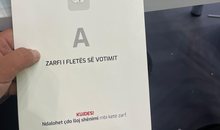


Video/ Footage goes viral, Erdogan forcibly grabs Macron's finger
2025-05-18 12:12:07
Pope Leo XIV's inauguration mass begins in St. Peter's Square
2025-05-18 11:48:16

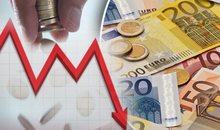
Foreign exchange, May 18, 2025
2025-05-18 10:43:26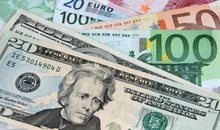
"Rivalry with the Dollar!" The Economist: Can the Euro Become a Global Currency?
2025-05-18 10:28:45

Mexican navy ship crashes into Brooklyn Bridge in New York, 2 dead, 17 injured
2025-05-18 09:37:43
With only two votes difference, Xhaçka takes Gjylameti's mandate in Tirana
2025-05-18 09:10:02
With clear skies and passing clouds, here's the weather forecast for today
2025-05-18 09:02:45
Horoscope for today, May 18, 2025
2025-05-18 08:35:57
Albania shines on the Eurovision stage, ranks 8th
2025-05-18 08:21:33
Morning Post/ In 2 lines: What mattered yesterday in Albania
2025-05-18 08:02:35
Knife wound in Durrës, perpetrator on the run
2025-05-17 21:59:13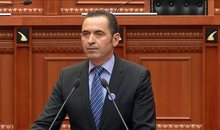


Fier closes the count: These are the MPs who win the mandate
2025-05-17 20:40:04
When politics "ditches" even the water source, Tragjasi surrenders to the SP
2025-05-17 20:16:27


After months of chaos, Romanians prepare to elect president
2025-05-17 19:09:39

Deadly tornado hits two US states, killing 20
2025-05-17 18:18:09


Vučić at rally in Niš, Serbian students organize protest in Subotica
2025-05-17 17:03:26
Iran's Supreme Leader Rejects Trump's Comments on Nuclear Program Proposal
2025-05-17 16:41:36



Risk of ethnic tensions, EU criticizes actions in northern Kosovo
2025-05-17 15:31:34
Manipulation of Diaspora votes in Greece/ Minutes prove distortion of results
2025-05-17 15:14:53
Heavy traffic in Tirana, long lines of cars on the Grand Ring Road
2025-05-17 14:52:24
May 11, Celibashi: 109 extra ballots are found, we are conducting verifications
2025-05-17 14:39:41
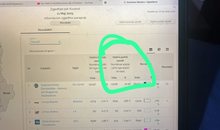

Green or yellow? This is the healthiest banana
2025-05-17 13:50:30


Berisha: The right of Albanians to vote as free citizens is our greatest goal
2025-05-17 13:03:20

Rei Nozllin punched the secretary of CEAZ No. 30 in Kashar, he is left in prison
2025-05-17 12:41:43
Caught with cannabis, two young people arrested in Tirana
2025-05-17 12:27:02
Topalli accuses of massive manipulation of votes from the Greek diaspora
2025-05-17 12:13:57
Vote counting from Greece, PD: Not to be included in the final result
2025-05-17 11:59:01
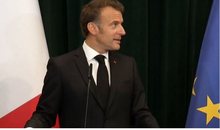
Ukraine peace talks, Macron: Faced with Putin's cynicism, Trump will react
2025-05-17 11:18:54
Criticism of Vjosa Osmani, Macron: I hope that dialogue will resume next week
2025-05-17 11:01:28
Dreams won't come true for others.
2025-05-17 10:41:56
Tonight's 'Eurovision 2025' final, Shkodra 'Elektronike' performs 26th
2025-05-17 10:23:07
Armored vehicle attacked with Kalashnikov rifle in Greece, driver escapes
2025-05-17 09:59:38
French President Macron arrives at the Prime Minister's Office, welcomed by Rama
2025-05-17 09:41:11
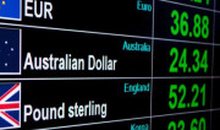
Foreign exchange/ How much foreign currencies are bought and sold today
2025-05-17 09:03:11
After limited success, new parties turn their eyes back to the electoral system
2025-05-17 08:54:39
"Relaxation is the motto", the stars' forecast for your sign
2025-05-17 08:38:32
Weather forecast for today
2025-05-17 08:25:13
Morning Post/ In 2 lines: What mattered yesterday in Albania
2025-05-17 08:00:30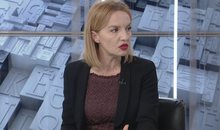
Zhulali: Rama has transformed Albania's foreign policy into his personal policy
2025-05-16 22:57:14
EU concerned about recent operations in northern Kosovo
2025-05-16 22:42:45


VIDEO/ Rama kneels in Tirana, Meloni "puts in the scissors"
2025-05-16 21:48:15


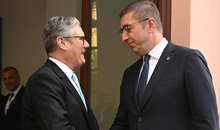
Britain and North Macedonia reach agreement on strategic partnership
2025-05-16 21:07:11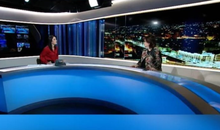

Israeli forces do not stop barrage against Houthis, bombard port
2025-05-16 20:43:28
Two vehicles collide on the Laç-Patok axis, one of the drivers injured
2025-05-16 20:30:56
A couple of tourists from Arabia have an accident in Berat
2025-05-16 20:26:52


